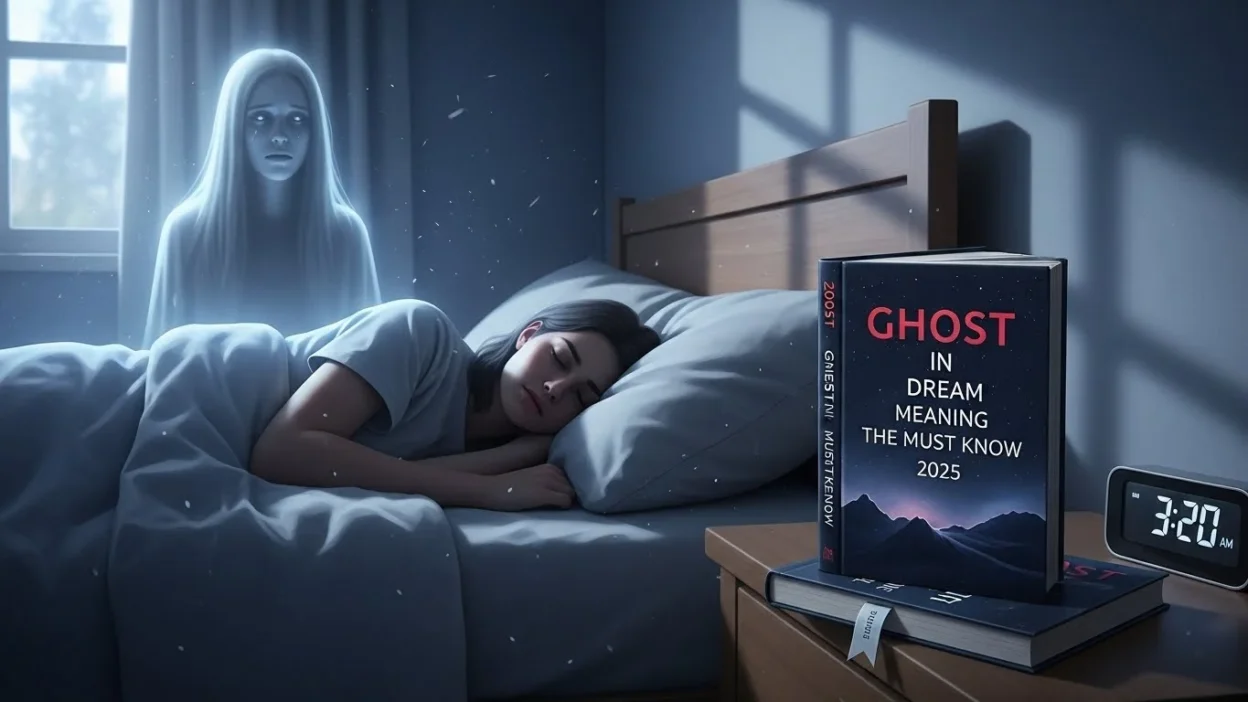Dreaming of a ghost in a dream usually symbolizes unresolved emotions, hidden fears, or lingering memories from the past.
These dreams can reflect anxiety, loss, or unfinished business in your waking life, but they may also suggest spiritual guidance or transformation depending on the context.
Why Ghost Dreams Fascinate Us
Dreams have always been windows into the subconscious, and ghost dreams, in particular, strike a deep emotional chord. The image of a ghost often carries mystery, fear, and symbolism that makes such dreams especially memorable. Whether you wake up feeling spooked, comforted, or curious, ghost dreams often leave a lasting impression.
The meaning of seeing a ghost in a dream can vary widely. Some people interpret it as a sign of spiritual presence, while others see it as a manifestation of repressed thoughts or fears. Dream analysts and psychologists suggest that these dreams can highlight unresolved grief, guilt, or even opportunities for personal growth.
In this article, we’ll explore the general symbolism of ghost dreams, variations and their specific meanings, cultural and historical symbolism, and psychological perspectives. By the end, you’ll have a clearer understanding of what it might mean when a ghost appears in your dream.
General Meaning and Symbolism of Ghost in Dream
Dreaming of a ghost is layered with psychological and spiritual interpretations. According to dream experts like Carl Jung, ghosts often represent aspects of the psyche that are hidden or repressed. Freud, on the other hand, associated dreams of ghosts with unresolved conflicts and suppressed desires.
Common Symbolic Meanings:
- Unresolved emotions: Ghosts often symbolize things left unsaid or undone.
- Fear of the unknown: They can reflect anxieties about the future or hidden aspects of yourself.
- Spiritual presence: In many cultures, a ghost dream can signal guidance from ancestors or loved ones who have passed away.
- Personal transformation: Some interpret ghosts as symbols of change, marking the end of one chapter and the beginning of another.
From a psychological perspective, dreaming of ghosts may arise when you are struggling with past trauma or unresolved grief.
Spiritually, some traditions suggest that such dreams are messages from beyond, urging you to pay attention to signs or relationships that matter.
In short, ghost dreams can be unsettling but are rarely meaningless. They act as mirrors of the inner world, revealing what needs acknowledgment, healing, or closure.
Common Variations of Ghost Dreams and Their Meanings
Because dreams are deeply personal, the way a ghost appears can change the interpretation. Below are the most common variations of ghost in dream meaning and what they may reveal.
Dream of Seeing a Ghost
This is the most straightforward type. Seeing a ghost may symbolize something haunting you—such as guilt, regret, or unresolved issues. On the positive side, it can also mean that you’re becoming aware of something hidden that you need to confront.
Dream of Talking to a Ghost
Communicating with a ghost often represents your desire for closure. It might mean you are seeking advice, forgiveness, or understanding from someone who is no longer part of your life. Spiritually, it can be interpreted as guidance from beyond.
Dream of Being Chased by a Ghost
This type of dream usually highlights avoidance. You may be running from problems in your waking life—emotions, responsibilities, or past mistakes. The ghost symbolizes what you fear to confront.
Dream of Helping or Comforting a Ghost
Interestingly, helping a ghost suggests you are coming to terms with something from your past. It’s often a positive dream indicating healing and acceptance.
Dream of a Friendly Ghost
Not all ghost dreams are frightening. A friendly ghost can symbolize protection, guidance, or reassurance. It may reflect your subconscious reminding you that you’re not alone.
Dream of a Malevolent or Angry Ghost
An angry ghost is often linked to guilt or suppressed anger. It may reveal inner turmoil or unresolved conflicts in relationships.
Special Contexts: Birthday, Wedding, or Family Ghost Dreams
- Birthday ghost dream: Symbolizes memories, nostalgia, or fear of aging. It can also mean you’re reflecting on milestones.
- Wedding ghost dream: Suggests fears about commitment, unresolved past relationships, or blessings from ancestors.
- Family ghost dream: Seeing deceased relatives often reflects longing, ancestral connection, or unfinished conversations.
Case Study Example
A woman dreamed repeatedly of her late grandmother’s ghost appearing in her kitchen, silently watching her cook. Initially, she felt frightened. Upon reflection, she realized the dream symbolized her grandmother’s influence in her life.
Cooking was their shared bond, and the dream nudged her to honor that legacy by passing family recipes down to her children. In this case, the ghost in dream meaning was not fear but heritage and continuity.
Cultural and Historical Symbolism of Ghost Dreams
Ghosts have played a role in human storytelling for centuries, shaping how we interpret them in dreams.
Ancient Beliefs
In ancient Greece and Rome, ghosts were seen as restless spirits with unfinished business. Dreaming of them was believed to be a warning or a message from the underworld.
Religious Perspectives
- Christianity: Ghosts in dreams were often interpreted as souls in purgatory or spiritual tests of faith.
- Hinduism: Ghosts, or preta, symbolize unresolved karma and are reminders to live virtuously.
- Chinese tradition: Dreams of ancestors’ ghosts are seen as auspicious, signaling guidance and blessings.
Folklore and Mythology
Throughout history, ghost stories in folklore often taught moral lessons. For example, in Shakespeare’s Hamlet, the ghost reveals truth and drives action, showing that a ghost can symbolize the awakening of hidden knowledge.
Etymology
The word ghost derives from the Old English gāst, meaning “spirit” or “soul,” which reinforces its role as a symbol of the unseen.
These cultural layers enrich the ghost in dream meaning, showing it’s not merely personal but also shaped by centuries of collective belief.
Psychological Insights and Personal Growth
From a psychological lens, ghost dreams often highlight the shadow self—the parts of us we ignore. They invite introspection and self-growth.
Practical Advice:
- Dream journaling: Write down ghost dreams to identify recurring themes. This helps track unresolved issues.
- Mindfulness practices: Meditation or deep breathing can reduce the anxieties that fuel unsettling dreams.
- Therapy or counseling: If ghost dreams are frequent and distressing, talking to a professional may uncover hidden emotional blocks.
- Habit change: Sometimes, these dreams highlight unhealthy patterns. Confronting them in waking life can reduce their intensity.
In essence, ghost dreams can be an opportunity for self-awareness. By reflecting on them, you may uncover truths that lead to healing and personal transformation.
FAQs About Ghost in Dream Meaning
1. What does it mean to dream of a ghost chasing you?
This typically symbolizes avoidance or fear. It suggests you’re running from problems, emotions, or unresolved issues in your waking life.
2. Are ghost dreams always negative?
No. While some are unsettling, others can symbolize protection, guidance, or ancestral blessings. The context of the dream matters.
3. Can a ghost dream mean a real spirit is visiting me?
Some spiritual traditions believe so. However, psychologists suggest ghost dreams are more often tied to memory, grief, or subconscious fears.
4. Why do I keep dreaming of a deceased loved one as a ghost?
Recurring dreams of deceased relatives often indicate longing, unresolved grief, or the desire for closure. They may also reflect ancestral connection.
5. How can I stop having scary ghost dreams?
Practicing mindfulness, addressing stressors, and keeping a dream journal can help. If persistent, consider speaking to a therapist to explore underlying causes.
Conclusion
Dreaming of a ghost often mirrors what lingers in your subconscious—unresolved emotions, hidden fears, or spiritual connections. These dreams can feel unsettling, but they carry meaningful messages about healing, closure, and personal growth.
Next time you encounter a ghost in your dream, pause and ask: what part of my past or present is calling for attention? Embrace the message, and let it guide you toward growth.

Olivia Bennett is a lifestyle researcher and holistic wellness advocate specializing in mindfulness, dream healing, and manifestation techniques. With a background in psychology and meditation therapy, Olivia writes to empower readers to achieve mental clarity and emotional balance through dream awareness. Her articles provide practical tips, spiritual insights, and real-life strategies for boosting intuition and creating a more meaningful life. Olivia’s work at DreamingSign.com inspires readers to use dreams as a tool for personal transformation.




